Small Scale Agriculture
The Pemba Foundation supports Pemba's farmers by: designing and installing small, efficient drip irrigation systems; introducing high-value crops like passion fruit; and developing vanilla production and export.
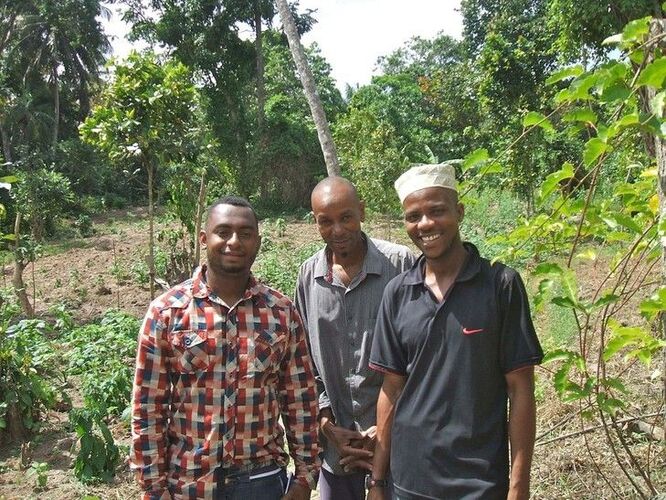

irrigation:
Nassor, left, from Pemba Foundation and Bakar, center, visiting Ali's farm to design his new irrigation system. Bakar received his system in 2014 and now advises other farmers for the Foundation.
Pemba has good farmland, but yields are severely limited by the 6-month dry season. With abundant groundwater, recharged during the rains, Pemba is an ideal place for irrigated agriculture. But as domestic water networks develop, groundwater demand is growing fast, so it's essential to use water-efficient drip methods for irrigation. Most farmers cannot afford to invest in irrigation, and we receive many requests from all over the island for help.
We design systems, provide the materials and advice, and the farmers contribute the labour for well-digging, land clearing and system building. Most systems use a conventional petrol-powered or electric water pump. We would like to install pumps that use renewable energy, like an innovative low-tech wind pump designed by EMAS, a Bolivian rural-technology organisation. We fabricated one locally and tried it out on one farm, but it was expensive compared to a petrol pump. Now we are trying a new solar-electric pump made in India.
Some of our systems use our own design of drip emitters: they're effective, easy to clean and cost much less than commercially available designs.
In addition to subsistence crops, some farmers are growing, at our suggestion, passion fruit for cash. It's a non-traditional crop, and brings good prices in local markets. The potential of irrigated agriculture in Pemba is demonstrated by the success of Bakar Hamad Said, one of the first farmers for whom we built a drip irrigation system, in 2014. Bakar now harvests 40 kg of passion fruit every 2 days. Wholesalers come to him to buy at $1/kg, and because his plants are protected from the dry season it's year-round income. He's added a watermelon field to take advantage of spare pump capacity, and is building a house on his farm for a worker and family. Bakar's 3-acre farm before irrigation made about $3/day, which had to support a family of 7 plus 2 dependents and other extended family -- way below the usual poverty line of $1-2/person/day. With irrigation, the farm yields $12/day, which lifts Bakar and his family out of poverty.
Bakar has become a skillful and successful farmer and businessman. He taught himself how to get the best out of irrigation, and how to market his produce. Now he advises other farmers on using our irrigation systems.
We've installed about 20 small irrigation systems so far, and we'll continue to install as many as funding allows -- Pemba could use literally hundreds.
Our irrigation program was originally proposed by an adviser, Jeroen de Boorder.
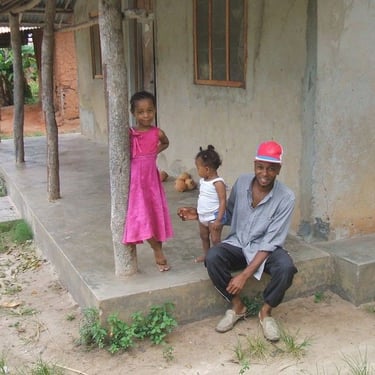
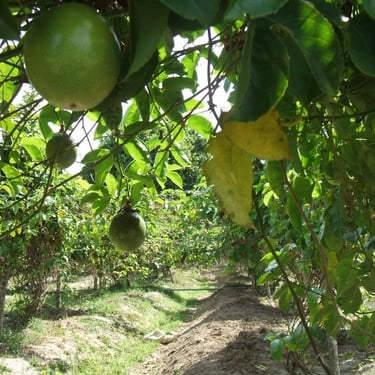
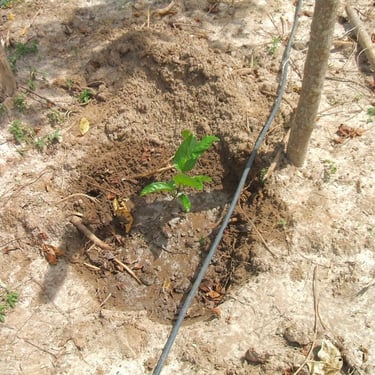
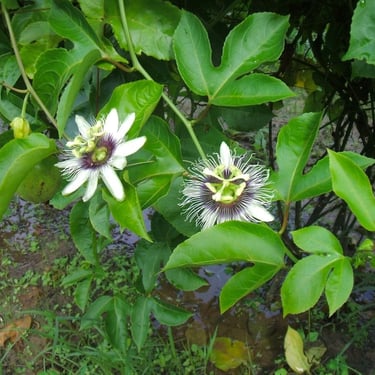
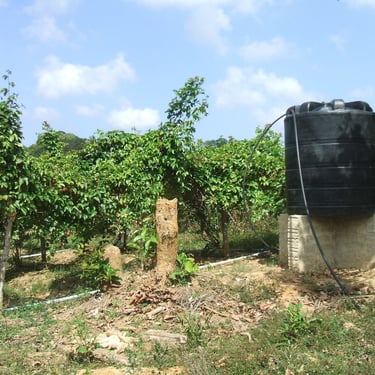
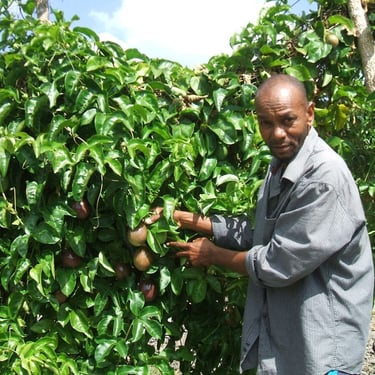
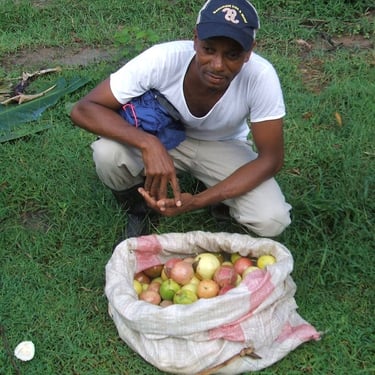
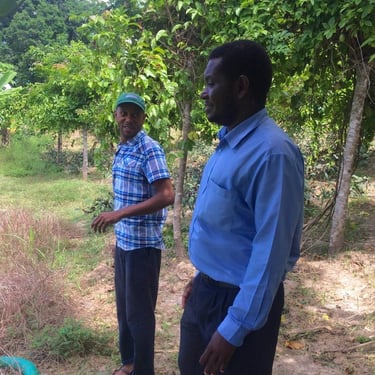
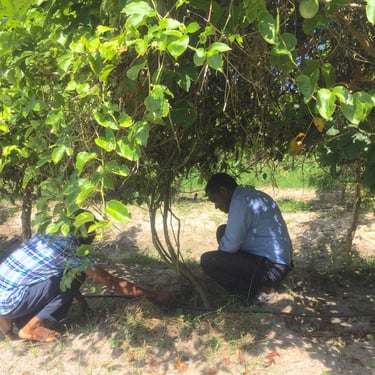
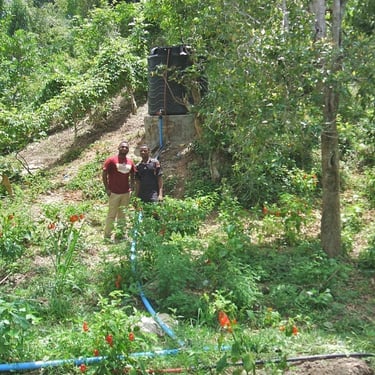
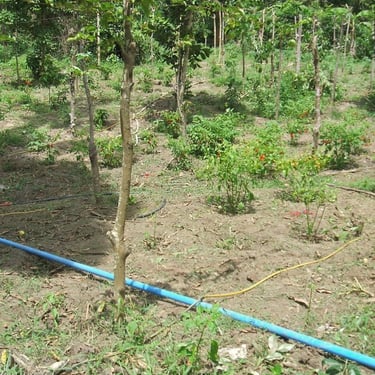
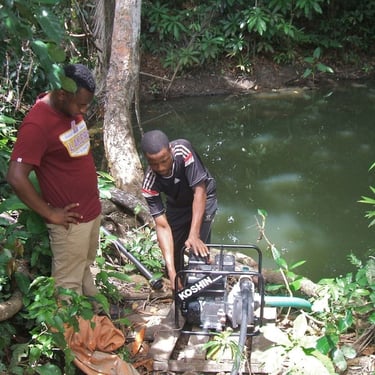
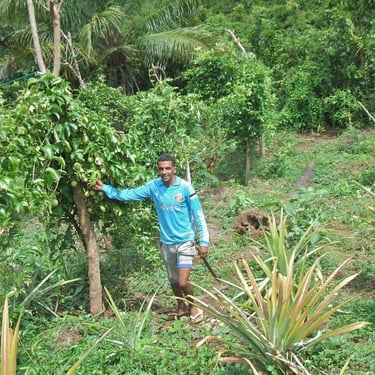
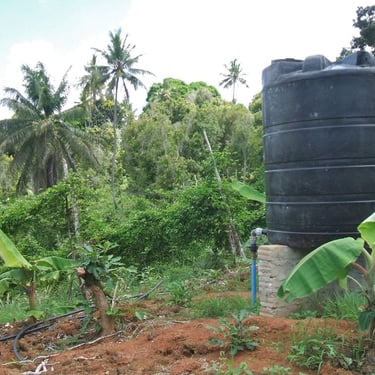
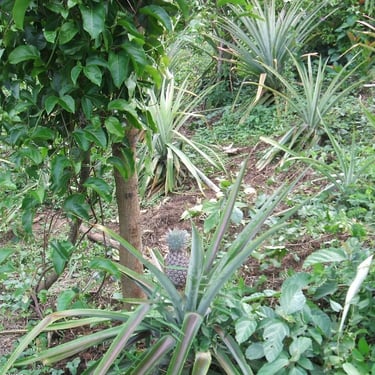
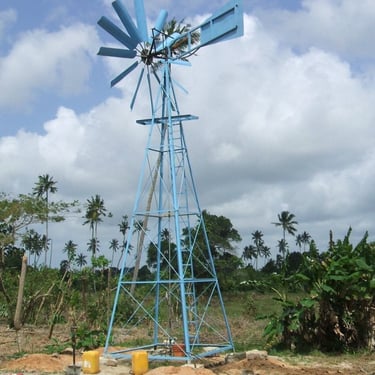
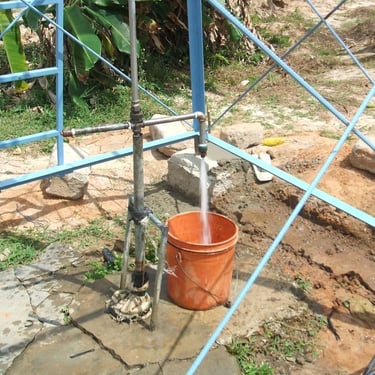
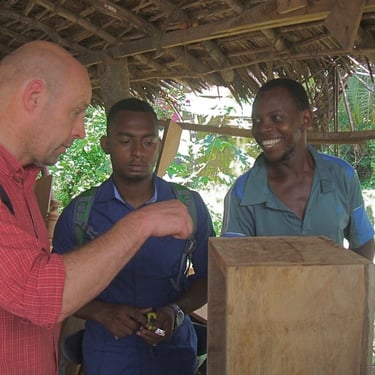
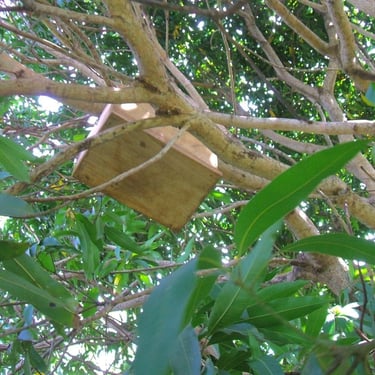
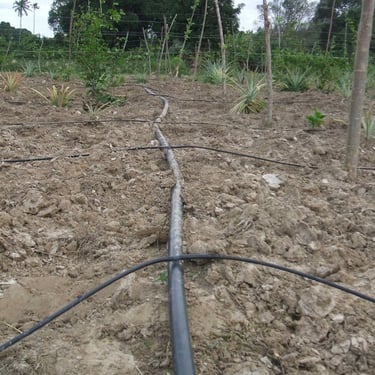
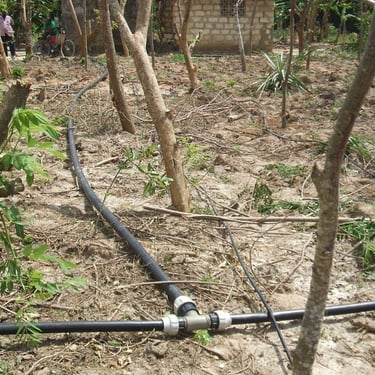
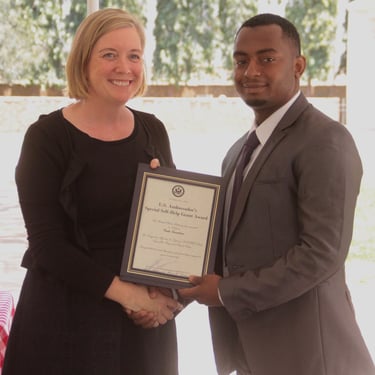
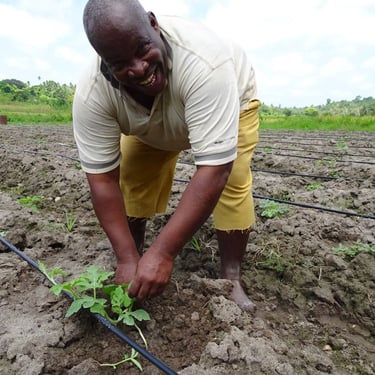
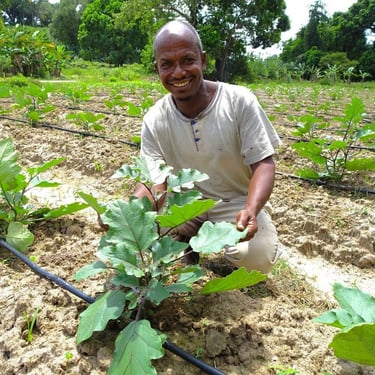
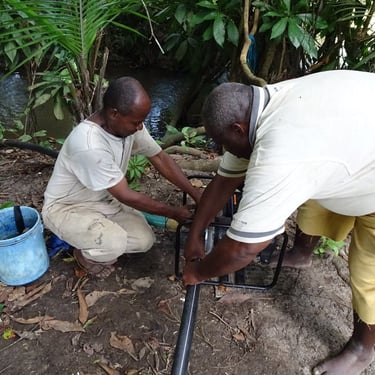
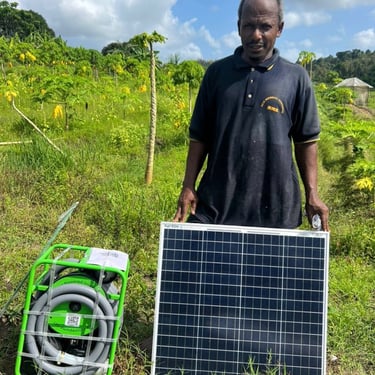
Bakar with 2 of his 5 children
Bakar's farm produces in the dry season
Passion fruit seedling
Passion fruit flowers
Tank feeds into irrigation pipes on Bakar's farm
Bakar with passion fruit crop
1 day's passion fruit harvest
Omar Mshindo from Zanzibar Water Authority
Nassor with Ali building his system
To be Ali's passion fruit field
Ali starts up his new pump
Khulfan Said with passion fruit vines
We designed Khulfan's system for the steep slopes
Intercropping takes full advantage of irrigated land
On Ibrahim's farm trialing the EMAS wind pump
Wind driven pump is submerged in the borehole
Jeroen discussing how to make a bee box
Bee box is for pollinating passion fruit flowers
Drip pipes laid out on Ibrahim's farm
Posts will take root and be termite proof
Virginia Blaser at US embassy presents irrigation award to Nassor
Asa growing tomatoes with his irrigation system
Rubea growing eggplant with his new system
Rubea and Asa have neighbouring farms and share a pump
Bakar explaining Pemba Foundation's drip system
Rubea is trying out a solar pump
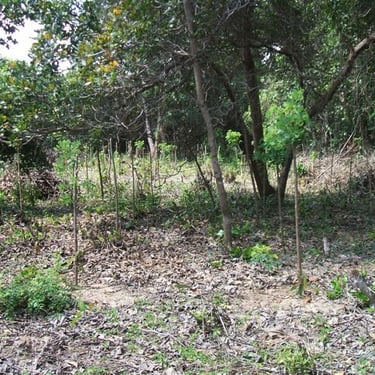
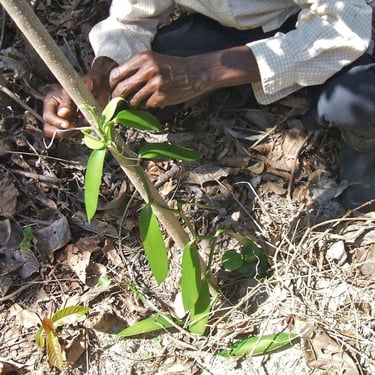
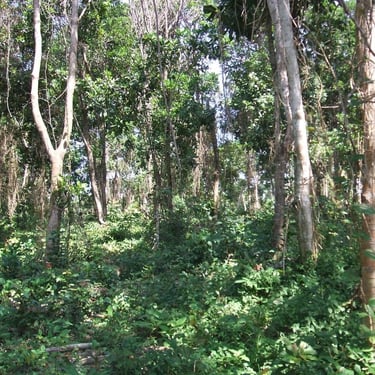
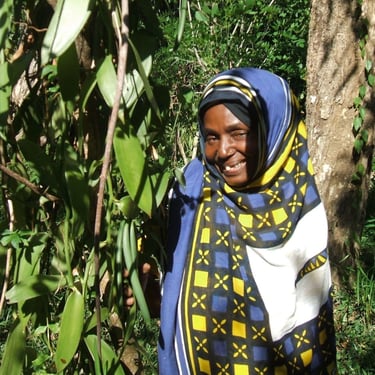
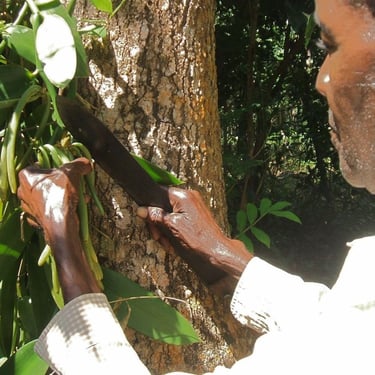
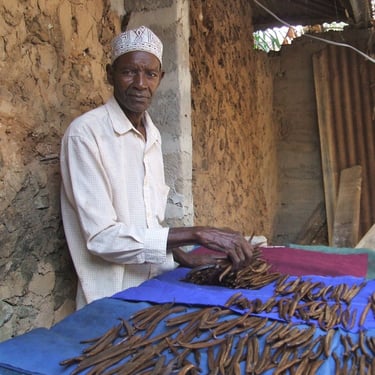
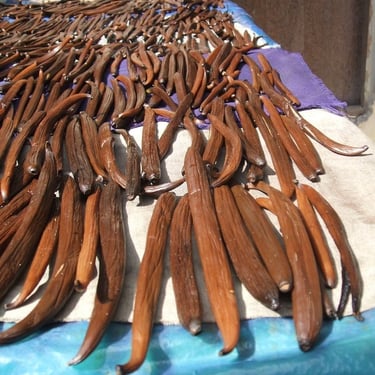
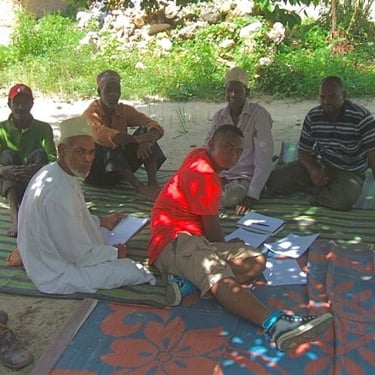
vanilla:
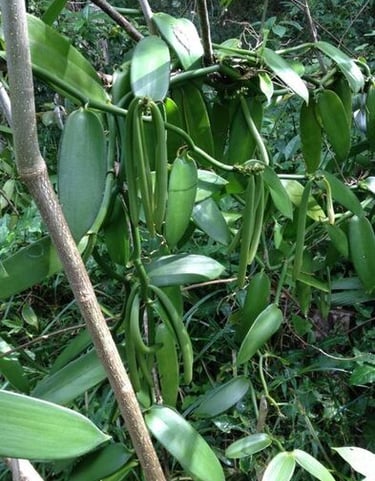

Vanilla vines planted in a Pemba forest
Vanilla is a non-traditional crop for Pemba, introduced to the island by an aid program in the 1990s. But it's hard to grow and was not widely adopted.
Vanilla is a vine that needs good rains during its growing season, warm conditions as the pods mature and a shady forest environment -- just right for Pemba. But it's labor-intensive: outside its native central America its flowers have to be hand-pollinated, day after day as each one opens. And then after harvest the pods must be cured slowly in the sun, a few hours a day for two months. Finished vanilla sells for high prices, but no farmer can risk the time and labor to produce it unless there's the certainty of a market at the end of the process. Marketing internationally is a challenge for small scale farmers.
Vanilla has the potential to greatly increase income for any farmer with access to some forested land -- which many Pemba farmers have. And Pemba vanilla is some of the best in the world.
Starting in 2014 the Pemba Foundation gave grants to farmers to plant new vanilla areas, and made arrangements for experienced vanilla farmers to pass along their knowledge. And we exported Pemba vanilla on a non-profit basis to a UK based online retailer.
Then world vanilla prices increased sharply and for the first time international buyers started coming to Pemba. So farmers no longer needed help selling their crop. Now the market has settled and in 2024 we resumed exporting and completed a shipment of Pemba vanilla to a US online retailer.
Cleared for new vanilla planting
Tying up new vanilla vine
Vanilla plantations become part of the forest
Amina is an expert hand-pollinator of vanilla flowers
Nassor from Pemba Foundation buying vanilla for export
Bakari Mataka harvesting pods
Mr Mataka cures pods at his house
Pods curing. They'll be black when ready
MISSION
To enhance the lives and livelihoods of the people of Pemba Island
©2025 Pemba Foundation.
CONTACT
SIGN UP
For our newsletter
In the USA:
+1 617 669 9628
call or WhatsApp
jangier@pembafoundation.org
In Tanzania:
+255 776 761 370
call or WhatsApp
nassormarhun@pembafoundation.org
